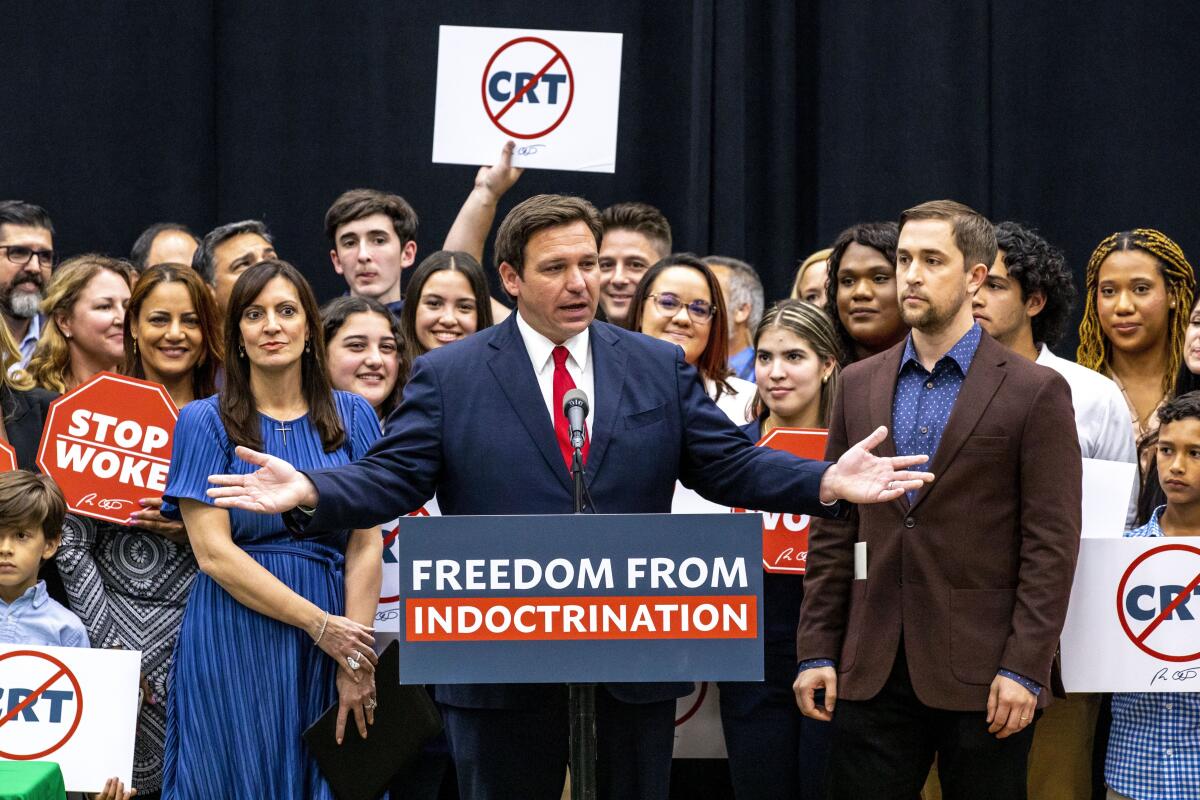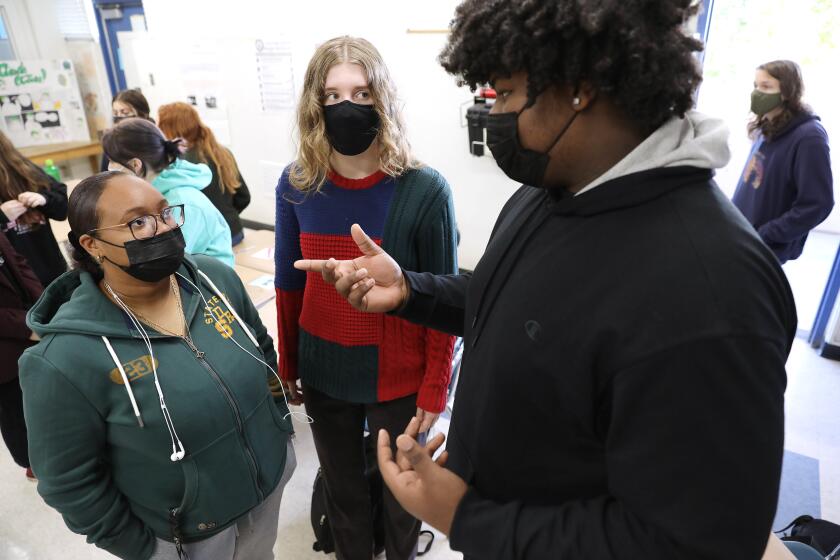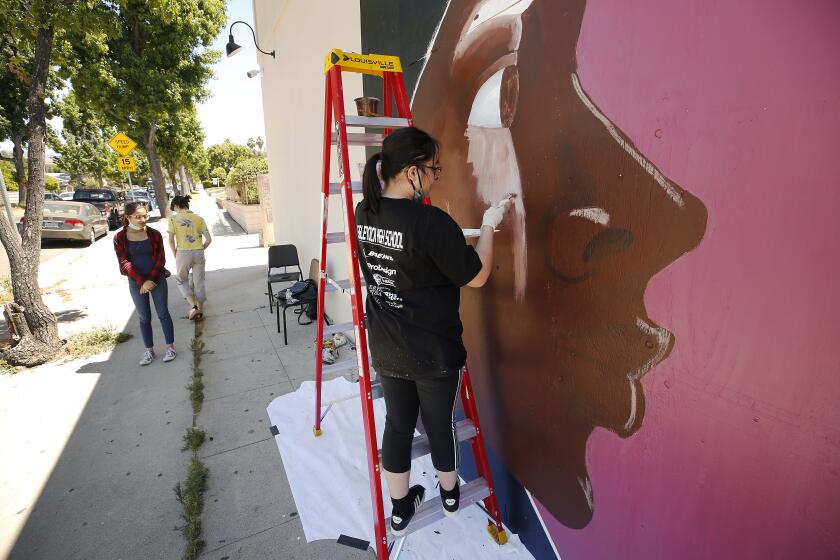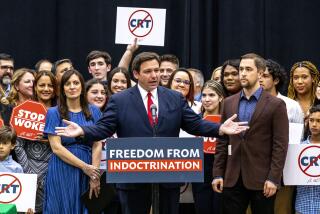Column: How Gov. Ron DeSantis bullied the College Board over Black studies — and why he was wrong

- Share via
After reviewing the College Board’s draft curriculum for its new Advanced Placement course in African American studies, Florida Gov. (and presidential wannabe) Ron DeSantis loudly lambasted it last month — and declared that he would ban the course in Florida’s schools.
On Wednesday, less than two weeks later, the College Board came out with a revised plan, omitting or downgrading some of the more controversial pieces of the curriculum, including sections on reparations, the Black Lives Matter movement, incarceration and “Black Queer Studies.”
All this has caused great uproar. Conservatives say that the original curriculum was “woke” and “lacked educational value” and was “pushing an agenda.” Their opponents argue that the College Board now has cravenly watered down the curriculum in response to conservative bullying.
Opinion Columnist
Nicholas Goldberg
Nicholas Goldberg served 11 years as editor of the editorial page and is a former editor of the Op-Ed page and Sunday Opinion section.
This much is unquestionable: DeSantis and other conservatives have been on a misguided mission to bar certain subjects in schools, including those they think normalize gay and transgender “lifestyles” and those perceived as promoting critical race theory, their latest bête noire. Some Republicans insist that teachers must stop teaching “toxic propaganda” about the United States.
These attempts at educational censorship are outrageous. And if the College Board made concessions in its revised curriculum because of pressure from Republicans, that was cowardly and unprincipled. (The College Board denies that it changed the curriculum due to criticism from DeSantis.)
To me, though, the chief point is not whether schools get to teach about Black Lives Matter or Black queer studies or Black conservatism or Afrofuturism or Black feminism. It’s not whether Kimberlé Crenshaw or Angela Davis has been included or excised. Even with the changes to the curriculum, there’s still plenty to learn about African American history and culture.
What matters most in my view are two fundamental principles. One is that politicians shouldn’t dictate what gets taught; academics and teachers should. We don’t want grandstanding Republican (or Democratic) politicians with no expertise in Black studies pandering to their constituents’ prejudices and forcing their politicized versions of events on educators and students. That goes for DeSantis as well as for legislators in states like California, who have over the years sometimes sought to push curricula to the left.
On the first day of Black History Month, the College Board is releasing details of its first Advanced Placement class on African American studies for high school students.
Academic freedom should be the rule. Lesson plans shouldn’t be set by elected officials with axes to grind and campaigns to win.
The second principle — and it helps explain why we don’t want politicians like DeSantis messing around in our classroom lessons — is that teaching cultural studies and especially history is not about (or at least shouldn’t be about) indoctrination or propagandizing or telling a one-sided story. It should be about nuance and complexity, about clashing facts and alternative perspectives and competing interpretations.
Unfortunately, Republican politicians don’t seem to see it that way. They claim they want to stop indoctrination — but in fact they just want their own version of events to be taught.
Former President Trump foolishly and shortsightedly believed we should only teach the “magnificent truth” about America. We shouldn’t teach Americans to “hate their own country and to believe that the men and women who built it were not heroes, but rather villains.” That seems to be the DeSantis playbook as well: We shouldn’t teach about past discrimination in a way that might potentially make students “feel guilty.”
Removing present-day topics and focusing on history while marketing the course as comprehensive perpetuates the myth that anti-Black racism exists solely in the past.
That’s an idiotic way to look at American history. The truth is that the story of this country is complicated. The goal in the classroom should be to present the country’s past as honestly as possible, and to introduce a wide range of ideas and points of view — and to teach students to reach rational, considered, intellectually honest conclusions.
There is no one American “magnificent truth.” There was slavery, which we as a society agree was a cruel and morally indefensible institution, but there was also opposition to slavery. There was Jim Crow, but after way too long, it was rejected.
Thomas Jefferson was a slaveowner but also a founding father. African Americans were denied citizenship and the right to vote until, finally, they weren’t. Terrible racial injustices occurred — and though we have fewer lynchings today, injustices continue, thanks to deeply embedded problems in our social, cultural, political and economic systems.
If students learn all that, and if they are exposed to debates among serious scholars and commentators, perhaps they’ll come to see the country, accurately, as both great and deeply flawed.
Students in Florida and elsewhere don’t need a curriculum that says the Black Lives Matter movement is right or wrong about police violence or that reparations are the correct or incorrect way to atone for racism and slavery. Nor should those subjects be banned or omitted. What students need is a textured, complicated, multifaceted view of the black, white and gray areas of American history, which will help teach them to think hard about the choices that still lie ahead.
More to Read
A cure for the common opinion
Get thought-provoking perspectives with our weekly newsletter.
You may occasionally receive promotional content from the Los Angeles Times.














